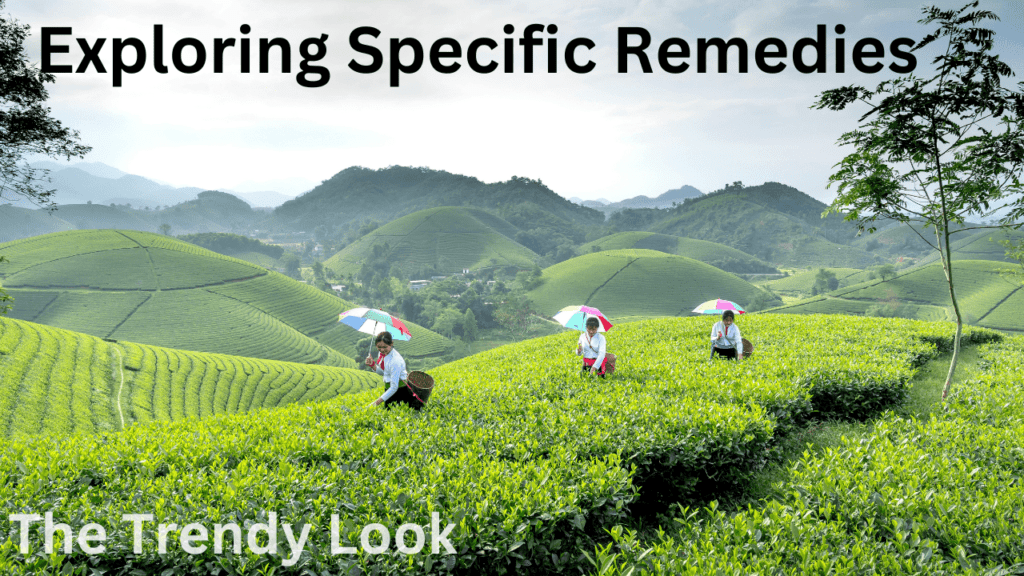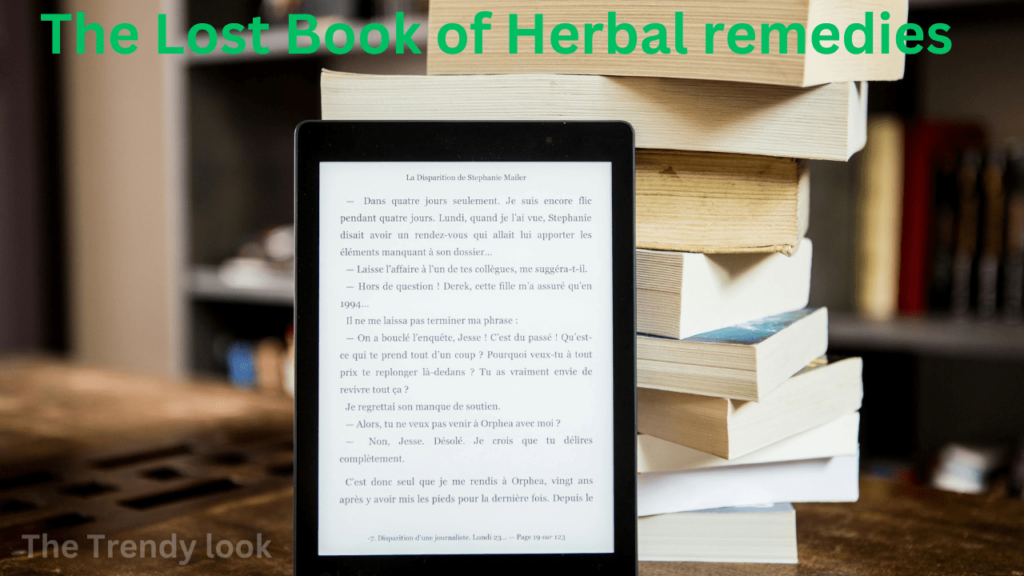Introduction
In a world where modern medicine often takes center stage, there’s a growing movement of individuals seeking alternative, natural methods of healing. This shift has sparked renewed interest in ancient wisdom, particularly in the realm of herbal remedies. Among the most revered resources in this space is “The Lost Book of Herbal Remedies.” This article delves deep into the essence of this remarkable book, exploring its origins, the wealth of knowledge it offers, and why it has become an indispensable resource for those interested in natural healing.
The Origins of “The Lost Book of Herbal Remedies
“The Lost Book of Herbal Remedies” is a treasure trove of knowledge passed down through generations. It draws on the expertise of Claude Davis, a renowned survivalist and herbalist, and Nicole Apelian, Ph.D., a biologist and herbalist with extensive experience in natural medicine. The book is the culmination of their lifelong dedication to studying and practicing herbal remedies.
The title suggests a connection to ancient traditions that have been overshadowed by modern pharmaceutical approaches. Davis and Apelian sought to revive this knowledge, making it accessible to contemporary audiences who may have lost touch with these time-honored practices. Their work is not just a collection of remedies but a cultural preservation of herbal wisdom that was once commonplace in every household.
Understanding Herbal Remedies: A Brief Overview
Before diving into the specifics of “The Lost Book of Herbal Remedies,” it’s important to understand what herbal remedies are and why they hold such enduring appeal. Herbal remedies are treatments made from plants or plant extracts used to prevent, alleviate, or cure various ailments. They have been used for thousands of years by different cultures across the globe, from the indigenous tribes of North America to the ancient civilizations of China and Egypt.
The efficacy of herbal remedies lies in their natural compounds, which can have powerful medicinal properties. Unlike synthetic drugs, which often target specific symptoms, herbal remedies aim to treat the whole body, promoting balance and overall health. This holistic approach is one of the key reasons people are drawn to herbal medicine, especially as concerns about the side effects of modern pharmaceuticals continue to grow.
Key Features of The Lost Book of Herbal Remedies
The Lost Book of Herbal Remedies is more than just a guide—it’s an encyclopedia of natural medicine. The book is meticulously organized, making it easy for readers to find the information they need. Some of the key features include:
1: Comprehensive Plant Descriptions
The book covers over 800 plants, trees, and shrubs, providing detailed descriptions of each one. It includes information on where to find them, how to identify them, and what parts are used for medicinal purposes.
2: Step-by-Step Instructions
For each remedy, the book offers clear, step-by-step instructions on how to prepare and use the herbs. Whether it’s making a tea, tincture, poultice, or salve, the instructions are easy to follow, even for beginners.
3: Color Photos and Illustrations
The book is richly illustrated with color photographs and drawings, which help in identifying plants accurately. This visual aspect is particularly helpful for those new to herbalism.
4: Historical and Cultural Insights
The authors provide historical context for many of the plants and remedies, offering insights into how they were used by indigenous peoples and ancient civilizations. This adds depth to the reader’s understanding and appreciation of herbal medicine.
5: Modern Applications
While rooted in tradition, the book also discusses how these remedies can be applied to modern health concerns. It bridges the gap between ancient wisdom and contemporary needs, making it relevant for today’s readers.
Why “The Lost Book of Herbal Remedies” Is a Must-Have
In a time when people are increasingly turning to natural alternatives, “The Lost Book of Herbal Remedies” stands out as a must-have resource. Here are some reasons why this book is invaluable:

1:Self-Reliance and Empowerment
One of the greatest benefits of herbal remedies is the empowerment they offer. With the knowledge in this book, individuals can take control of their health and well-being without relying solely on conventional medicine. This is especially important in situations where access to medical care may be limited.
2: Safety and Efficacy
The remedies in the book are based on centuries of use and have been thoroughly researched by the authors. This ensures that the information provided is both safe and effective. Additionally, the book offers guidance on dosages and potential side effects, helping readers use the remedies responsibly.
3: Sustainability
Herbal remedies are often more sustainable than pharmaceutical drugs. They can be grown in your garden, foraged in the wild, or purchased from ethical sources. This reduces the environmental impact and supports a more sustainable approach to health care.
4: Cost-Effective
Many of the remedies in the book can be made from plants that are readily available and inexpensive. This makes herbal medicine a cost-effective option, particularly for those who may not have access to affordable healthcare.
5: Holistic Health
Unlike many modern treatments that focus on symptom management, herbal remedies address the root cause of ailments and promote overall well-being. This holistic approach aligns with the body’s natural healing processes, leading to more lasting and comprehensive health benefits.
Exploring Specific Remedies
To give you a taste of what “The Lost Book of Herbal Remedies” offers, let’s explore a few specific remedies highlighted in the book.
1. Elderberry (Sambucus nigra)
Elderberry has long been revered for its immune-boosting properties. Traditionally used to treat colds and flu, elderberry is packed with antioxidants and vitamins that help reduce inflammation and fight off infections. The book provides detailed instructions on how to make elderberry syrup, which is particularly effective in the early stages of a cold.
2. Plantain (Plantago major)
Often considered a weed, plantain is actually a powerful medicinal herb with a wide range of uses. It has anti-inflammatory, antimicrobial, and wound-healing properties, making it an excellent remedy for cuts, insect bites, and rashes. “The Lost Book of Herbal Remedies” teaches readers how to create a plantain poultice, a simple yet effective treatment for skin irritations.
3. Chamomile (Matricaria chamomilla)
Chamomile is well-known for its calming effects, making it a popular remedy for anxiety, insomnia, and digestive issues. The book explores various ways to use chamomile, including as a tea, tincture, or compress. It also discusses the herb’s lesser-known benefits, such as its ability to soothe skin conditions like eczema.

The Importance of Ethical Foraging
While “The Lost Book of Herbal Remedies” encourages readers to explore the natural world and harvest their own herbs, it also emphasizes the importance of ethical foraging. The authors provide guidelines on how to forage responsibly, ensuring that plants are not over-harvested and that ecosystems remain intact. This section of the book is crucial for those who wish to practice herbalism in a way that respects nature and promotes sustainability.
The Role of Herbal Remedies in Modern Health
In the context of modern health, herbal remedies offer a complementary approach that can be integrated with conventional medicine. Many people use herbal remedies alongside prescribed medications to enhance their overall health. For example, herbal teas can support digestion, reduce stress, and improve sleep quality, while tinctures and salves can address specific issues like pain and inflammation.
However, it’s important to approach herbal remedies with care. While they are natural, they are not without risks. The book provides guidance on how to use herbs safely, including information on potential interactions with medications and the appropriate dosages for different age groups.
Testimonials and Success Stories
One of the most compelling aspects of “The Lost Book of Herbal Remedies” is the testimonials from readers who have successfully used the remedies to improve their health. These stories offer real-life examples of how the book has made a positive impact on people’s lives. From managing chronic conditions to overcoming acute illnesses, the testimonials demonstrate the power of herbal medicine when applied with knowledge and care.


